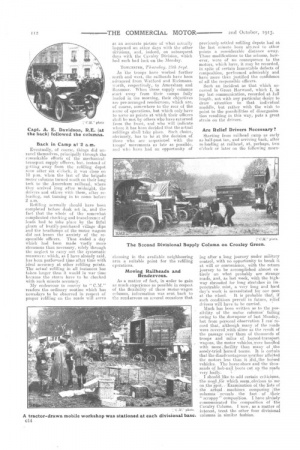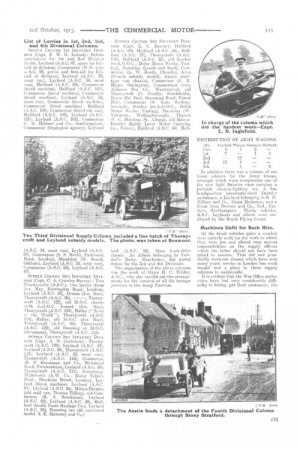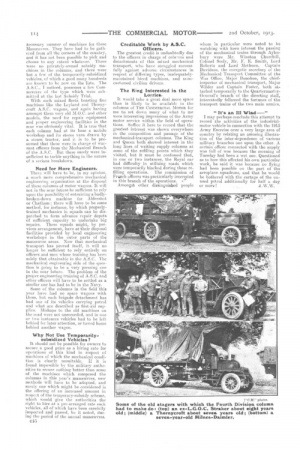Back in Camp at - 2 a.m.
Page 18

Page 19

Page 20

If you've noticed an error in this article please click here to report it so we can fix it.
Eventually, of course, things did unravel themselves, principally through the remarkable efforts of the mechanical transport. supply officers, but. instead of gAting away from the refilling depot soon after six o'clock, it. was close on 10 p.m. when the last. of the brigade motor columns turned south on their long trek to the Amersham railhead, where. they arrived long after midnight, the drivers and others with them, after reloading, not turning in to camn before 2 am.
Refilling normally should have been completed before dusk set in, and the fact that the whole of the somewhat complicated checking and transference of loads had to take place by the fitful gleam of hastily-purchased village dips and the headlamps of the motor wagons did not lessen the anxiety of the responsible officers. Thus ended a day which had been made vastly more strenuous than necessary, solely through the neglect to carry out the systematic manceu.vre„ which, s I have already said, has been performed time after time with ideal accuracy at other refilling points. The actual refilling in all instances has taken longer than it would in war time because the stores have to be checked
with such minute accuracy.
11-1v endeavour to convey to " readers the ordinary routine which has nowadays to be observed hi respect of proper refilling 0I1 the roads will :serve
as an accurate picture of what actually happened on other days with the other divisions, and, indeed, on subsequent days with the Cavalry Division, which had such bad luck en the Monday.
TOWCESTER, Thin'6'day, 25th Sept, As the troops have worked further , north and west, the railheads have been . advanced from Watford and RickmansveJrth, respectively, . to Amersham and -13exmoor, . When these supply columns start away from their camps fully loaded in the morning, their objectives arc pre-arranged rendezvous, which are, of course, somewhere to the rear of the acetic of operations, but which only have to serve as points at which their officers stilll be met by others whe have returned from the front, and who will indicate where it has been decided that the actual refillings shall take place. Such choice, obviously, has to be at the decision of those who are acquainted with the troops' movements as late as possible, and who have had an opportunity of
previously-settled refilling depots had at the last. minute been altered to other points a considerable distance away. These modifications to the scheme, however, were of no consequence to the motors, which have, it may be recorded, in spite of certain lamentable defects of composition, performed admirably and have more than justified the confidence of all the responsible officers.
Such an incident as that which occurred in Great Horwood, which I, in my last communication, recorded at full length, not with any particular desire to draw attention to that individual muddle, but rather with the wish to point to the possibilities of disorganization resulting in this Way, puts a great strain on the drivers.
Are Relief Drivers Necessary ?
Starting from railhead camp as early as half-past ten, and arriving back, after re-loading at railhead, at, perhaps, two o'clock or later on the following morn choosing in the available neighbouring area a suitable point for the refilling cperatiens.
Moving Railheads and Rendezvous.
As a matter of fact, in o/der to gain as much experience as possible in respect of the flexibility of these motor-wagon columns, information was sent back to the rendezvous on several occasions that ing, after a long journey under military control, with no opportunity to break it at will or convenience, with the return journey to be accomplished almost en tirely on what probably are strange roads, and, as last week, with the highway shrouded for Long stretches in itnpenetrable, mist, a very long and hard day's work is necessitated for one _man at the wheel. It is probable that, if such conditions prevail in future, relief drivers will have to be carried.
Much has been written as to the possibility of the motor columns' failing owing to the ,downpour of last Monday, but from personal observation I can' record that, although many of the roads were covered ,with slime as the result of the passage over them of thousands of troops and 'miles of hoesed-transport wagons, the motor vehicles_were handled with snore facility than many of ,the sorely-tried herself teams. It is certain that the disadvantageous weather affeeted the motors less than it „didethe horsed vehicles. The horse-shoes and the thousands., of hub-nail .b. 'cots cut up the reads very badly. 4 ' I
I should like to add certain eriticiqms, the-need .for which.seem,obvious to me on„the ..,c.pot. 'Examination of. the lists of
• the actual machines composing the columns reveals . the fact . of ,their "scrappy" composition. I have alre:ady communicated the composition of Cavalry Column. I now, as a matter of interest, treat the other four divisional columns in similar fashion.
List of Lorries in 1st, 2nd, Srd, and 4th Divisional Columns.
SUPPLY COLUMN 1ST INFANTRY DIVISION (Capt. F. W. G. Lelaud): Belsize (une-tormer for 1st and 2nd Division :nails), Leyland (A.S.C. 47,spare for kithalf of division), Commercar (W.O. type A S.C. 93, petrol and first-aid for lefthalf of division), Leyland (A.S.C. 35, meat van), Leyland (A.S.C. 34, meat van), Hanford (A.S.C. 90), Commercar (hired machine), Hallford (A.S.C. 107), Commercar (hired machine), Commercar (hired machine), Leyland (A.S.C. 32, meat van), Commercar (hired machine), Commercar (hired machine) Halliard (A.S.C. 106), Commercar (hired tilt. van), Hanford (A.S.C. 105), Leyland (A.S.C. 1043), Leyland (A.S.C. 101), Commercar (C. G. Hilobert and Co., Southampton), Commercar (Orpington agency), Leyland &IMPLY COLUMN 4TII INFANTRY (Capt. L. C. Beanie): Hanford (A.S.C. 89), Hanford (A.S.C. 88), Hanford (A.S.C. 87), Ther»:,,•croft
116), Hanford (A.S.C. 55), old Straker (exL.G.O.C., Defoe Motor Works, Tooting), Maudsiay (Leach and Seed), Commerear (L. W. Booth, Cheadle), Aries (French subsidy model), Austin (now typevan chassis), Commercar (S. M. Higgs, Orpington), Commercars (two, Alliance Box Co., Warrington), old Thornycroft (G. Goodly, Southfields), Berra (Ed. Paul, Stanstead Road, Forest
Commercar (W. Vale, Wellingborough], Straker (ex-L.G.O.C., Defoe Motor Works, Tooting), Maudslay (W. Valentine, Wellingborough), Thames (F. C. Stratton, St. Albans), old MilncsDaimler (Little Lever Motor Carrying Co., Bolton), Hanford (A.S.C. 54). Hall (A.S.C. 34, meat van), Leyland (A.S.C. 97), Commercar (S. S. Nevin, :Parkhurst Read, London), Mandalay (W. Beard, Oldham), Leyland (A.S.C. 35, meat. van), Commercar (A.S.C. 93), Leyland (A.S.C. 47).
SUPPLY COLUMN 2ND INFANTRY DIVISION (Capt., 0, A. Crawley-Roevey): Two Thornverofts (A.S.C.,), two lorries (from Jos. May, Fartingdort Road, London), Leyland (A.S.C. 20), Dennis (Jos. May),
Thornycroft (A.S.C. 96), , Thornycroft (A.S.C. 123), old M.O.C. chassis with :L.G.O.C. bonnet (Jos. May), Thornycroft (A.S.C. 124), Halley ("News of the World"), Thornycroft (A.S.C. 114), Halley, old M.O.C. (Jos. May), rl'hornycroft (A.S.C. 95), Thornycroft (A.S.C. 122), old Buessing or M.O.C. (Oetzmann), Thornycroft (A.S.C. 115).
SUPPLY COLUMN 3RD INFANTRY DIVISION (Capt. A. M. Gockshott): Thornycroft (A.S.C. 120), Leyland (A.S.C. 57), Leyland (A.S.C. 59), Thornvcroft (A.S.C. 119), Leyland (A.S.C. 33, meat van), Thornycroft (A.S.C. 118), Commercar (R. S. Brookman and Co., Richmond Road, Twickenham), Leyland (A.S.C. 60), Thorny:croft (A.S.C. 117), Armstrong. Whitworth (A.W. Co., Motor 'Vehicle Dept., Blenheim Street, London), Leyland (hired machine), Levlarld (A.S.C. 611; Leyland (A.S.C: 58), Milnes-Daimler (old mail van, Thomas Tilling), old Commercar (R. S. Brookman), Leyland (A.S.C. 62), Leyland (A.S.C. 39), Hanford (South Coast Haulage Co.), Leyland (A.S.C. 36), Buessing (an old converted model. S. E. Mahoney and Cu.)
ford (A.S.C. 53), Mass front-drive chassis. An Albion belonging to Yewdall's Dairy, Manchester, did • postal (Intim for the 3rd and 4th Divisions.
The organization of the above columns was the work of Major H. C. Wilder, A.S.C., who also carried out the arrangements for the removal of all the tentage previous to. the Army Exercise.
Of the hired vehicles quite a number were entirely unfit for the work to which they were pin and placed very serious responsibilities on the supply officers which the latter should not have been asked to assume. That old and practically worn-out chassis which have seen many years' service in London bus work should find a. place in these supply columns is undesirable.
It is evident, that the War Office authorities have had very considerable difficulty in hiring, per their contractor, the necessary number of machines for these Matocuvres. They have had to be gathered from all the corners of the country, and it has not been possible to pick and choose to any extent whatever. There were no privately-owned subsidy machines in the columns, and there were but a few of the temporarily-subsidized vehicles, of which a good many hundreds are known to be now on the lists. The A.S.C., I noticed, possesses a few Commerears of the type which were submitted at the last. Subsidy Trial.
With such mixed fleets boasting fine machines like the Leyland and Thornycroft A.S.C. wagons, and again having amongst them very old M.O.C. and other models, the need for repair equipment and proper engineering facilities in. the rear was obviously vital. It is true that each column had at its base a mobile workshop and its stores vans drawn by a steam tractor, and it is to be presumed that these were in charge of warrant officers from the Mechanical Branch of the A.S.C. But these surely were insufficient to tackle anything in the nature of a serious breakdown.
Need for More Engineers.
There will have to be, in my opinion, a much more comprehensive mechanical engineering organization at the disposal of these columns of motor wagons. It will not in the near future be sufficient to rely upon the possibility of entraining a badlybroken-down machine for Aldershot or Chatham : there will have to be some method, for instance, by which properlytrained mechanics in squads can be dispatched to form advance repair depots of sufficient capacity to undertake big repairs. These squads might, by previous arrangement, have at their disposal facilities provided by local engineering workshops in the outer parts of the manceuvre areas. Now that mechanical transport has proved itself, it will no longer be sufficient to rely entirely on officers and menwhose training has been solely that obtainable in the A, SC. The mechanical engineering side of the question is going to be a very pressing one irt the near future. The problem of the proper engineering training of A.S.C. and other officers will have to be settled as a similar one has had to be in the Navy. Some of the columns in the field this year have had no spare wagons with them, but each brigade detachment has had one of its vehicles carrying petrol and What are described as first-aid sopplies. Mishaps to the old machines un the road were not. unrecorded, and in one or two instances vehicles had to be left behind for later attention, or towed home behind another wagon.
Why Not Use Temporarily. ' subsidized Vehicles?
It should not be possible for owners to secure a good price as a. hiring rate for operations of this kind in respect of machines of which the mechanical condition is clearly unsuitable. If it is found impossible by the military authorities to secure nothing better than some of the machines which composed the columns in this year's manceuvres, new methods will have to be adopted, and surely one which might be considered is the offering of an increased amount in respect of the temporary-subsidy -scheme, which would give the authorities the right to hire at a pre-arranged rate such vehicles, all of which have been carefully inspected and passed, be it noted, during the period of the annual manceuvres. Creditable Work by A.S.C. Officers.
The greatest credit is undoubtedly due to the officers in charge of colivans and detachments of this mixed mechanical transport, who have struggled successfully against adverse circumstances in respect of differing types, inadequatelymaintained hired machines, and unaccustomed civilian drivers.
The King Interested in the Lorries.
It would take a great deal more space than is likely to be available in the columns of THE COMMERCIAL MOTOR for me tu set down many of what to me were interesting impressions of the Army motor service within the held of operations. Suffice it here to record that the greatest interest was shown everywhere in the composition and passage of the mechanical-transport columns. The King and Queen both showed interest in the long lines of waiting supply columns at some of the refilling points which they visited, but it must be confessed that, in one or two instances, the Royal car had difficulty in utilising roads which were temporarily blocked during these refilling operations. The commission of Frcnch officers was particularly interested in this branch of the operations.
Amongst other distinguished people whom in particular were noted to be watching with keen interest the passing of the mechanical trains through Aylesbury were Mr. Winston Churchill, Colonel Seely, Mr. F. E. Smith, Lord Roberts and Lord Methuen. Captain Davidson, the energetic secretary of the Mechanical Transport Committee of the War Office, Major Donohue, the chiefinspector of mechanical transport, Major Wilder and Captain Foster, both attached temporarily to the QuartermasterGeneral's branch of the directing staff, interestedly followed the fortunes of the transport trains of the two main -armies.
"It's an HI Wind—" I may perhaps conclude this attempt to record the activities of the industrialmotor vehicle in connection with the 1913 Army Exercise over a very large area of country by relating an amusing illustration of the inter-dependence of various military branches one upon the other. A certain officer connected with the supply was full of woe because the morning of Tuesday had been a wet. one. Questioned as to how this affected his own particular work, he said it was because no flying had been possible on the part of the aeroplane squadrons, and that he would be bothered with the cartage of the unused petrol additionally for half a day
or morQ VS;', W.


























